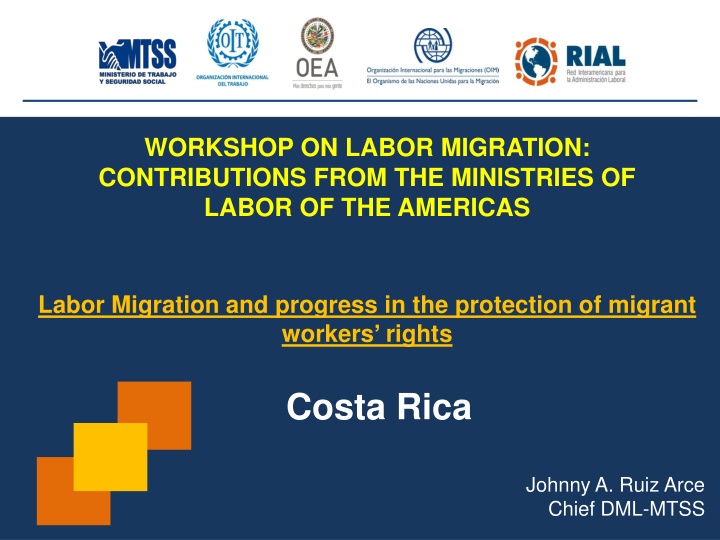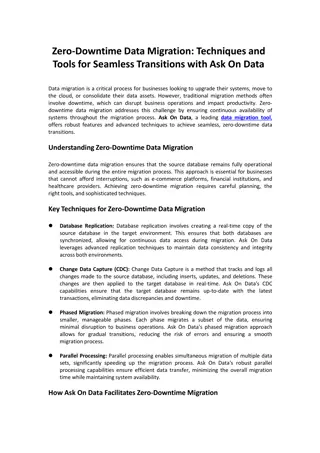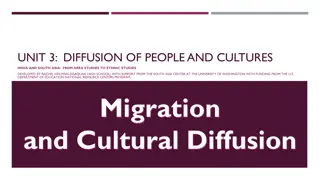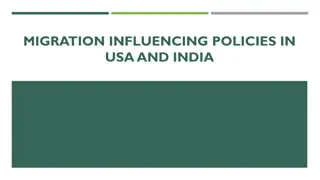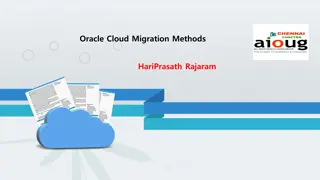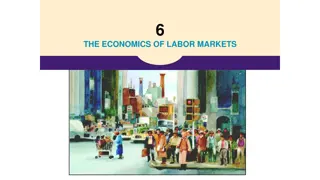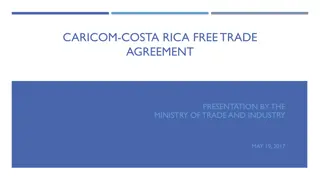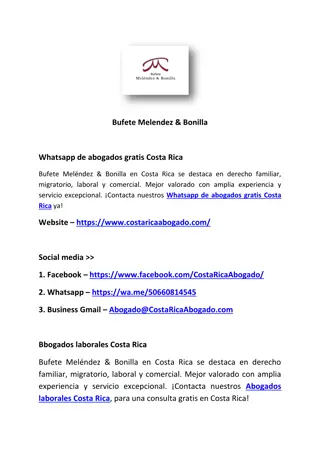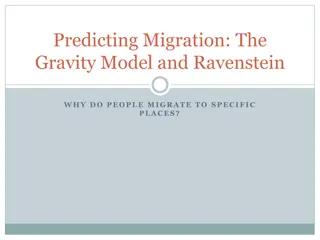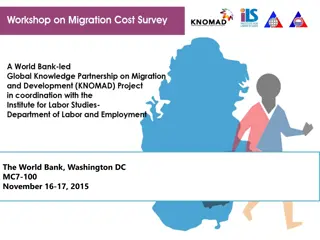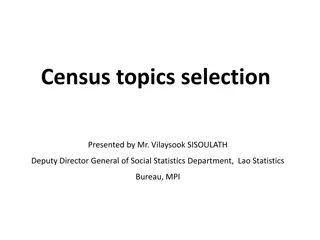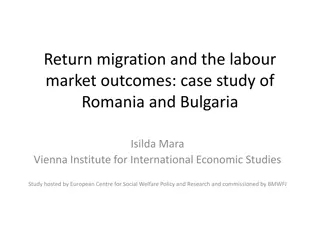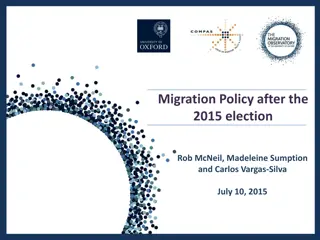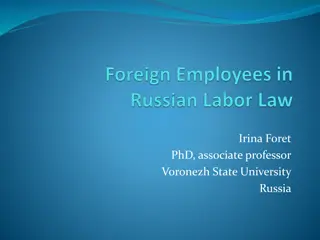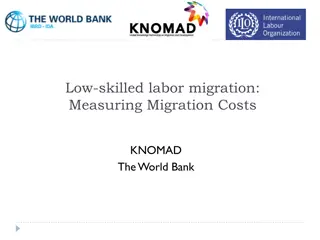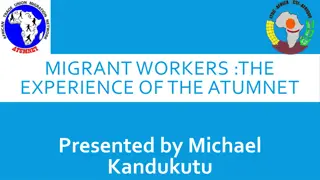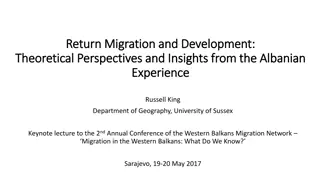Labor Migration Management Initiatives in Costa Rica
Costa Rica's efforts in labor migration management involve inter-institutional collaboration, establishing migration policies, and implementing the Labor Migration Information System (SIMLA). The country is focusing on protecting migrant workers' rights, enhancing cooperation with origin and destination countries, and redefining procedures for workers in specific sectors like agriculture. Additionally, Costa Rica emphasizes equality and non-discrimination for all migrants as per its Constitution.
Download Presentation

Please find below an Image/Link to download the presentation.
The content on the website is provided AS IS for your information and personal use only. It may not be sold, licensed, or shared on other websites without obtaining consent from the author.If you encounter any issues during the download, it is possible that the publisher has removed the file from their server.
You are allowed to download the files provided on this website for personal or commercial use, subject to the condition that they are used lawfully. All files are the property of their respective owners.
The content on the website is provided AS IS for your information and personal use only. It may not be sold, licensed, or shared on other websites without obtaining consent from the author.
E N D
Presentation Transcript
WORKSHOP ON LABOR MIGRATION: CONTRIBUTIONS FROM THE MINISTRIES OF LABOR OF THE AMERICAS Labor Migration and progress in the protection of migrant workers rights Costa Rica Johnny A. Ruiz Arce Chief DML-MTSS
WHAT IS BEING DISCUSSED IN THIS MEETING? Information on the labor market Experiences with regional information systems Usage of the information Application of labor protection rights The capabilities of inspection in the protection of rights Existing cooperation in origin and destination countries in order to protect these migrant workers
COSTA RICAS EXPERIENCE We have had an interesting experience with regard to inter- institutional and intersectoral work Integrated Migration Policy for Costa Rica and its Plan of Action/ 2013-2023 The General Law on Migration and Foreigners and its Regulations A good practice is the Costa Rica / Nicaragua CoDevelopment Project, which we continue to coordinate with the employer sector construction and paid transportation drivers. of agriculture, agroindustry,
COSTA RICAS EXPERIENCE We are redefining the management procedure for migrant workers in the agricultural and/or agro-industrial sector We categories for work defined by the Law (temporary workers, specific occupation workers, workers linked to specific projects, cross-border workers and temporary residents for employment purposes, among others). Additionally, there are those that are applied based on specific regulations by the General Management of Migration and Foreigners develop migration management through special
LABOR MIGRATION MANAGEMENT In a joint work of institutions we have been able to implement the Labor Migration Information System (SIMLA). Management recruitment sectors. Coordination efforts with social security have been maintained. has been sharing information with labor Costa Rica aims at agreements signed with our neighboring countries on labor migration; to the pronouncements issued by the Constitutional Chamber, which have gone a bit further.
LABOR MIGRATION MANAGEMENT The Principle of equality that protects migrants in the Political Constitution "Everyone is equal before the law and no discrimination contrary to human dignity can be made. Despite some of the international human rights instruments not being formally incorporated into our legal system, the Constitutional Chamber has made use of its extremely progressive criteria in order to integrate the block of constitutionality with important international human rights instruments."
LABOR MIGRATION MANAGEMENT There is an equalization of labor rights that has as a fundamental premise the limitation of any treatment between nationals and foreigners, which attends to the sole fact of nationality. Thus, what we have is an interpretation that recognizes the condition of being a worker, independent from and regardless of whether or not the worker has migratory status. The Council of Ministers of Labor of Central America and the Dominican Republic, instance that has addressed labor migrations including issues on labor rights, job security and irregular migration, among others. It is clear that in many countries, the productive sectors have undoubtedly benefited from migrant labor.
LABOR MIGRATION The mobility of people from origin to another State with the intention to work, this entails: - Migrations are part of the national development as well as the human development of migrants, all within the framework of equitable development and respect for human rights. - Measures of scarcity in strategic sectors of the labor market must be taken into account. We integrate the household surveys, specify the capacities and abilities to work from the occupational perspective.
LABOR MIGRATION - The reality of indicators for employment and unemployment, wage differences at source and destination, family situations and social conditions, since these stimulate the decision to migrate. - Follow up on the interest in contracting migrant workers and substantiate its motivation. - The whole management process then moves to promote the collection and dissemination of information. This is important to provide feedback to policy makers in this field. In Costa Rica, many public and private organizations have produced a lot of information.
LABOR MIGRATION - The information must serve the country of origin to orient the decision to migrate and consequently the States of origin today have to meet the demand for employment in their national context. promote regular migration, - The implementation and execution of bilateral agreements on labor migration should be encouraged as a good practice.
CONCLUSIONS WHAT CAN WE SAY ABOUT THIS EXPERIENCE? Ministries of Labor must make greater efforts and have a larger presence in the management of labor migration. Better institutional capacity is required if a strategy to facilitate labor flows is to be carried out. More information needs to be recorded and various means must be integrated in order to disseminate the information on a proposal basis.
CONCLUSIONS If we think of exchange instead of migration, we must give more follow up to labor contracting but with the conditions. Management in both country of origin and destination must involve different sectors and organizations of employers and workers. The region and its institutions should attend to improper practices. More attention on issues such as discrimination, xenophobia, racism, awareness and corporate responsibility. In destination countries, there is more demand for social protection required by these groups of workers. Social protection is a task and a great effort in controlling clandestine migration.
CONCLUSIONS Migrant workers and their training for employment. The topic of competencies selection of human resources is very important. and requirements for the The co-development project deserves a reflection as it generates and promotes development in the country of origin. Experiences in Spain and Colombia. It is better if migrants can apply to improve the use of remittances in country of origin. Monitoring and evaluation in employment. Observe the participation from the perspectives. Employers and workers organizations should be involved in these issues. public and the private
FINALLY It is not feasible for us to think of temporary migration agreements as a means to solve irregular migration or the lack of decent work in countries of origin. It is necessary to promote cooperation and phenomenon surrounding the migration phenomenon in general and with regard to labor, in particular. Remember that work is a means of personal fulfillment. dialogue on the migratory It is of great interest to collaborate between countries to collect and exchange good practice profiles of labor migration. The ministries must assume greater competence in the subject as well as participate management and administration of policy associating the policy of employment and work. in the elaboration,
FINALLY It is still important to continue efforts on the prevention of abusive migrations and illegal mobility practices such as the trafficking and smuggling of individuals. It is important to receive international cooperation to continue working on agile management and documentation procedures and to attend the reduction of processing costs. One principle is to recognize the work, the people what they do is make a living, so countries of employment should boost inspection mechanisms, penalize labor offences, and above all do not facilitate that migration is seen as an option of cheap labor.
ANNEXES TO INFORMATION The Co-development project Costa Rica / Nicaragua. - A model of supervised recruitment and contracting Recruitment of temporary workers and an authorized register of companies The competent institutions of both countries are articulated The amounts of human resources needed for productive sectors are recorded, studied and recommended Appropriate conditions for the work stay of the workers are supervised The labor contracts are signed and supervised by the ministries of labor. In the country of origin the ministry participates in orderly mobility In country of origin documenting workers for an orderly migration Migratory institutions monitor migratory movements among participating States.
GOOD LABOR MOBILITY MANAGEMENT Guide recruitment at country of origin and destination Protect rights and give advice Facilitate the sending of remittances Provide training support for work Maintain communication with families in origin Having available health services Protection against unforeseen circumstances (health, death, accident, other) Economic support through special procedures Migrant funds
Therefore if a person does not find in the place where he/she lives the conditions to live with dignity, he/she has the right to go where he hopes to live humanly. - (cfr., Mater et Magistra, Juan Pablo II) THANK YOU Johnny A. Ruiz Arce Chief, Department of Labor Migration MTSS COSTA RICA Email johnny.ruiz@mtss.go.cr Postal Code 10133 1000, Tourn n, San Jos Phone 2221-1068
